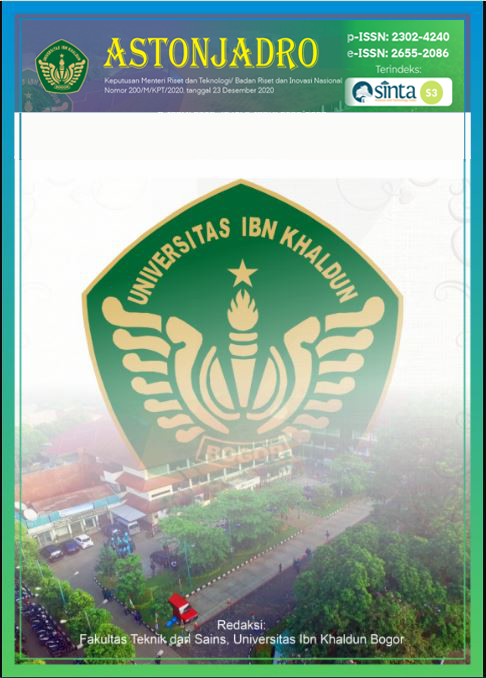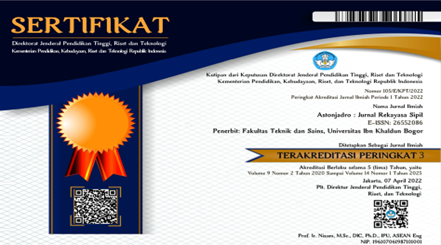Model of Implementation of the Concept of Corporate Social Responsibility (CSR) Through the Procurement of TPST in Jimbaran, Badung Regency
DOI:
https://doi.org/10.32832/astonjadro.v12i2.8903Keywords:
CSR, environmental Conservation, TPSTs, SDGs, K3.Abstract
The concept of implementing waste disposal at the final level generally uses the landfill method. As a result, because the accumulation of garbage that resembles a mountain causes the need for land capacity used to dispose of waste to become wider. The composition of waste in TPA is dominated by organic waste, inorganic waste that can be recycled, and inorganic that cannot be recycled. In this article, the author collects data obtained through a literature study and analyzes qualitatively the role of PT. Youth and PT. Tirta Investama (Aqua Group) in providing Integrated Waste Treatment Sites (TPST). The steps of the two companies are a concept of sustainable development contained in the Sustainable Development Goals (SDGs) agenda. The method used in the analysis is to use quantitative methods. The analytical technique used is qualitative. Secondary data collection techniques are carried out by collecting data from related agencies, then analyzing these data using the SWOT method, which aims to describe the situation and explain the facts of the conditions being faced in a company. The results of the research are based on the synthesis of the four SWOT elements of facts that support the truth of the Strengths-Oppurtunities synthesis strategy, namely, in operating heavy equipment, a company must have an operational license and must have strict protocol and safety standards. This is implemented by the company in law no. 1 of 1970 concerning work safety. The results of the synthesis of the two Weaknesses-Opportunities elements factually explain that the company facilitates the community through areas that can be visited, in the form of booths filled with information. The Booth Area which contains this information is presented in an informative and imaginative way for the public to get to know how integrated waste management works. The application of waste at the Samtaku Jimbaran TPST has the goal of preserving the environment with the Zero Waste To Landfill Principle, which means that the waste collected at this facility will later be managed and can be fully reused so that nothing is wasted into the environment or ends up in the Final Processing Site (TPA).
References
Divianta, Dewi. 2022. Bau Menyengat Di Sekitar TPST Samtaku Jimbaran, Apa Penyebabnya? Liputan6, diakses 13 Juli 2022 melalui https://www.liputan6.com/regional/read/5011976/bau-menyengat-di-sekitar-tpst-samtaku-jimbaran-apa-penyebabnya
Haerawan, Y H M (n.d). Analisis SWOT Dalam Menentukan Strategi Pemasaran Alat Rumah Tangga Di PT. IMPRESSINDO Karya Steel Jakarta-Pusat. Artikel. Politeknik Tunas Pemuda. STIE Triguna Jakarta melalui https://media.neliti.com/media/publications/335230-analisis-swot-dalam-menentukan-strategi-04487bcb.pdf
Pu.go.id, Biro Komunikasi Publik Kementerian PUPR. PUPR Bangun 3 TPST Sampah Di Denpasar, Menteri Basuki: Tujuannya Untuk Perlindungan Lingkungan. Diakses 10 November 2022 melalui https://pu.go.id/berita/pupr-bangun-3-tpst-sampah-di-denpasar-menteri-basuki-tujuannya-untuk-perlindungan-lingkungan
Rusmayanti, A R. 2019. CSR dan SDG: Konsep Untuk Masa Depan Yang Lebih Baik. Filantra.org. Diakses 20 Maret 2019 melalui https://filantra.org/id/csr-dan-sdg-konsep-untuk-masa-depan-yang-lebih-baik/
Sehatqua.co.id. Peresmian Tempat Pengolahan Sampah Terpadu Sampahku Tanggung Jawabku (TPST Samtaku) Jimbaran - Kab Badung - Bali. Diakses 07 Oktober 2021 melalui https://www.sehataqua.co.id/peresmian-tempat-pengolahan-sampah-terpadu-sampahku-tanggung-jawabku-tpst-samtaku-jimbaran-kab-badung-bali/
Toarik, Mashud. 2021. TPST Samtaku Jimbaran, Upaya Produsen Megolah Sampah Kemasannya. Investor.id. Diakses 04 Desember 2021 melalui https://investor.id/national/273286/tpst-samtaku-jimbaran-upaya-produsen-mengolah-sampah-kemasannya
Widyaningsih, N. 2018. Model Penerapan Konsep Corporate Social Responsibility (CSR) Melalui Bank Sampah Untuk Mengurangi Sampah Kota Dan Meningkatkan Pendapatan Keluarga Miskin. Artikel. Forum Ilmiah Volume 15 Nomor 3, September 2018 melalui https://ejurnal.esaunggul.ac.id/index.php/Formil/article/download/2426/2081
Downloads
Published
How to Cite
Issue
Section
License
Copyright (c) 2023 ASTONJADRO

This work is licensed under a Creative Commons Attribution-ShareAlike 4.0 International License.
Paper submitted to ASTONJADRO is the sole property of the Astonjadro Journal. Unless the author withdraws the paper because he does not want to be published in this journal. The publication rights are in the journal Astonjadro.ASTONJADRO
LICENSE
This work is licensed under a Creative Commons Attribution-ShareAlike 4.0 International License.
Based on a work at http://ejournal.uika-bogor.ac.id/index.php/ASTONJADRO













